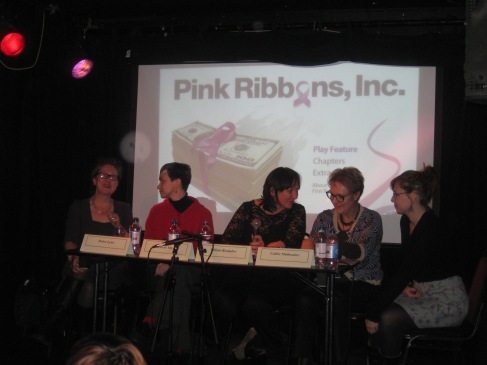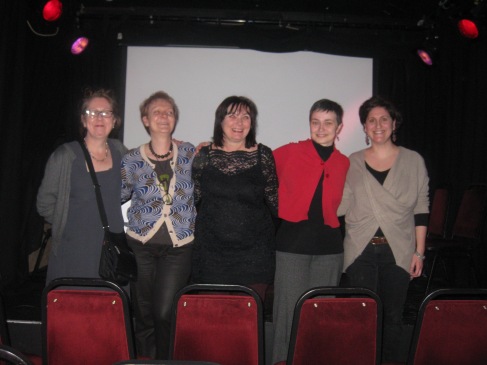Thanks to all who participated in a lively and inspiring evening around breast cancer awareness. After the Pink Ribbons, Inc. film, our three panellists briefly introduced themselves, their experiences and their work.
Helen Lynn has been campaigning for 17 years for breast cancer. She believes breast cancer can be viewed as a form of violence against women; women are consigned to what could be a preventable disease as chemicals that are in everyday use remain largely untested, or even worse, they continue to be used after they have been linked to cancer. Hence, women are exposed needlessly and wilfully to chemicals which are linked to the disease. Her organisation, Alliance for Cancer Prevention brings women and men together to work on these issues.
Grazia de Michele was diagnosed with cancer in the final year of her PhD. As a historian, Grazia didn’t accept “we don’t know why you have cancer” as an answer and keeps asking the uncomfortable questions. She rejects the term ‘survivor’ because she is aware of her mortality and wants to respect women who died of breast cancer. She is a hardcore believer that women need to be more involved with the process of diagnoses and treatment, and to have a more informed perspective. She started the Italian blog Furious Amazons to raise awareness, and contributes to the twitter hashtag BCSM – breast cancer social media.
Cathie Malhouitre defines herself as a survivor of the treatment, not the cancer. She believes in the importance of a realistic representation of cancer. Pink doesn’t cure; it creates a good feeling in people but without any real progress. This is because the two main aspects of living with breast cancer are still not made visible enough: having to live with it is an inescapable fact, and not enough coverage is given to those with metastatic/stage four cancer. She founded the French association “Within our Differences” to show the real experience of breast cancer and reflect the diversity of voices and definitions of beauty. For her, recovery is as much about recovering from the disease as about rebuilding your identity.
Our chair, Gillian Bendelow, a former nurse and mental health professional, is professor of sociology at the University of Sussex. She has worked for many years on mental health, chronic pain and illness, and emotional well being. She currently works in preventative healthcare with the NHS and user groups.
During the Q&A session several key themes came up:
(1) Information, or rather misinformation, surrounding breast cancer and current campaigns. Should charities and companies be made to declare how they allocate their money? Less than 4% is spent on prevention, but how is that broken down? Health professionals are reluctant to acknowledge their own lack of knowledge. The pharmaceutical industry is worth trillions of dollars, and companies are guilty of ‘disease mongering’ – of creating (or failing to prevent) a disease in order to increase profit in selling drugs. In the cancer establishment we hear the terms ‘prevention and cure’, but these are meaningless; there is no primary prevention being done although there could be, and there is no cure. ‘Prevention’ is conflated with early diagnoses by doctors, and this is misleading, as mammograms neither prevent cancer nor cure it.
(2) Participants were surprised to learn about environmental and occupational exposures to certain chemicals and substances as a contributing factor in breast cancer prevalence. Doctors too often talk about risk in terms of genetics or lifestyle factors like weight, diet etc. This hides the fact that environmental and occupational exposures to dangerous chemicals (through products and food, air and water, but even more so for women who work with things like pesticides and plastics) are more risky factors but less is known about them. There was a demand that awareness of the real risks needs to increase. Many reported a difficulty in finding accurate information for example about which cosmetic products are safe to use, although the Skin Deep website is one tool. Another issue raised was BPA, which is absent from certain children’s plastic products but should be banned from all plastics. The issues of endocrine disrupting chemicals (EDCs) like BPA are being debated in the European Parliament so you can write to your MEP about this now.
(3) Linked to misinformation, women’s voices are often absent, and there is a homogenisation of the diversity of experiences in campaigns. Questions raised included whether is it possible to design a breast cancer campaign that combines the solidarity and hope of the Pink Ribbons cause and yet acknowledges death and the right to express pain and anger.
(4) Gender and feminism within breast cancer discourse also emerged as important themes of debate. Should men be encouraged to get more involved? Should we frame breast cancer as a human rights issue alongside other cancers, rather than being segmented as a women’s problem and a feminist issue? One the one hand, women’s bodies are sexualised in mainstream breast cancer campaigns which makes it a feminist issue. But, men also suffer from breast cancer and have to conform to gender norms like being stoic and brave. The Moustache November/Movember campaign for prostate cancer also sexualises masculinity, and raises little awareness beyond marketing products. What lessons can we learn from the Pink Ribbons scandal and avoid this turning into another scam?
(5) Finally the discussion turned to possibilities for activism and further organising. How can we harness the public’s anger and make it more productive for change? Screenings of the documentary Pink Ribbons Inc. is a powerful tool to start debate, and when women who are affected by cancer come together there is hope. Social media has also been used with success to draw attention to, and challenge, companies’ malpractice (like the Milking Cancer campaign by Breast Cancer Action, the ‘watchdog’ of breast cancer campaigns). In your everyday life you can talk to family and friends to raise awareness, or write to your MEP. Academics can use their role as teachers, or write in accessible formats for different audiences.
The evening ended on a note of optimism and hope, we need to strengthen communication and solidarity in order to spread the word.


[…] NGender series wrote a follow-up about the event – Thought Provoking Questions Raised in Breast Cancer Debate – that introduced the panel and summarized the key themes discussed during the Question and […]